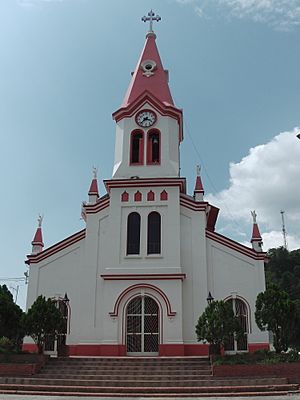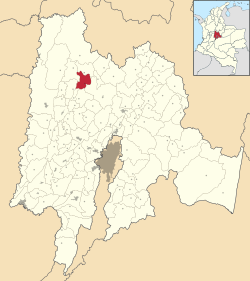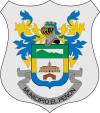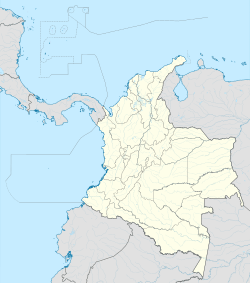El Peñón, Cundinamarca facts for kids
Quick facts for kids
El Peñón
El Peñón de Terama
|
|||
|---|---|---|---|
|
Municipality and town
|
|||

Church of El Peñón
|
|||
|
|||

Location of El Peñón in Cundinamarca
|
|||
| Country | |||
| Department | |||
| Province | Rionegro | ||
| Founded | 1822 | ||
| Founded by | Pedro Bustos | ||
| Area | |||
| • Municipality and town | 132 km2 (51 sq mi) | ||
| Elevation | 1,310 m (4,300 ft) | ||
| Population
(2015)
|
|||
| • Municipality and town | 4,805 | ||
| • Density | 36.40/km2 (94.3/sq mi) | ||
| • Urban | 445 | ||
| Time zone | UTC-5 (Colombia Standard Time) | ||
El Peñón is a town and a municipality (like a county) in Colombia. It is located in the Cundinamarca area. This town sits high up in the Andes mountains, about 1,310 meters (4,300 feet) above sea level.
El Peñón is part of the Rionegro Province. It shares its borders with several other towns. These include Topaipí to the north and Vergara and Nimaima to the south. Pacho is to the east, and La Peña and La Palma are to the west. The town is about 120 kilometers (75 miles) northwest of Bogotá, the capital city. Because it's not too high up, El Peñón has a pleasant, mild climate. The average temperature is around 21°C (70°F).
Contents
Discovering El Peñón's Past
Early Inhabitants
Long ago, even before the Spanish arrived, the area where El Peñón is now was home to the Panche. They were a group of indigenous people living in this region.
Founding the Town
The modern town of El Peñón was officially started in 1822. A person named Pedro Bustos founded it. He named it "El Peñón de Terama." This name honored a brave Panche leader, or cacique, named Terama. This cacique fought against the Spanish conquistadors (explorers and conquerors) and passed away in 1565.
Unique Geology
El Peñón Rock Formation
There's a special layer of rocks called the El Peñón Formation. It's named after this town. These rocks are from a very old time in Earth's history, known as the Lower Cretaceous period.
See also
 In Spanish: El Peñón (Cundinamarca) para niños
In Spanish: El Peñón (Cundinamarca) para niños
 | Selma Burke |
 | Pauline Powell Burns |
 | Frederick J. Brown |
 | Robert Blackburn |




